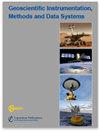Airborne electromagnetic data leveling based on structured variational method
IF 2.3
4区 地球科学
Q3 GEOSCIENCES, MULTIDISCIPLINARY
Geoscientific Instrumentation Methods and Data Systems
Pub Date : 2024-03-26
DOI:10.5194/egusphere-2024-306
引用次数: 0
Abstract
Abstract. The leveling errors are defined as the data difference among flight lines in airborne geophysical data. The differences of the signal leveling always show as a striping pattern parallel to the flight lines on the imaged maps. The fixed structured pattern inspires us to structure a guided leveling error model by an anisotropic Gabor filter. Then we embed the leveling error model in total variational framework to flexibly calculate leveling errors. The guided leveling error model constrain the noise term of total variation rather than just blind removal. Moreover, the structured variational method can be extended to remove other type of noises which have general noise priors. We have applied the method to the airborne electromagnetic, magnetic data, and apparent conductivity data collected by Ontario Geological Survey to confirm its validity and robustness by comparing the results with the published data. The structured variational method can better level airborne geophysical data based on the space properties of leveling error.基于结构变分法的机载电磁数据平差
摘要平差是指机载地球物理数据中飞行线路之间的数据差异。信号平差总是在成像图上显示为与飞行线平行的条纹状图案。这种固定的结构模式启发我们用各向异性的 Gabor 滤波器来构建一个有引导的平差误差模型。然后,我们将配平误差模型嵌入总变分法框架,以灵活计算配平误差。引导式平差误差模型限制了总变分的噪声项,而不仅仅是盲目去除。此外,结构变分法还可扩展用于去除具有一般噪声前值的其他类型噪声。我们将该方法应用于安大略省地质调查局收集的机载电磁、磁数据和视导率数据,通过与已公布数据的比较,证实了该方法的有效性和稳健性。根据平差误差的空间特性,结构变分法可以更好地平整机载地球物理数据。
本文章由计算机程序翻译,如有差异,请以英文原文为准。
求助全文
约1分钟内获得全文
求助全文
来源期刊

Geoscientific Instrumentation Methods and Data Systems
GEOSCIENCES, MULTIDISCIPLINARYMETEOROLOGY-METEOROLOGY & ATMOSPHERIC SCIENCES
CiteScore
3.70
自引率
0.00%
发文量
23
审稿时长
37 weeks
期刊介绍:
Geoscientific Instrumentation, Methods and Data Systems (GI) is an open-access interdisciplinary electronic journal for swift publication of original articles and short communications in the area of geoscientific instruments. It covers three main areas: (i) atmospheric and geospace sciences, (ii) earth science, and (iii) ocean science. A unique feature of the journal is the emphasis on synergy between science and technology that facilitates advances in GI. These advances include but are not limited to the following:
concepts, design, and description of instrumentation and data systems;
retrieval techniques of scientific products from measurements;
calibration and data quality assessment;
uncertainty in measurements;
newly developed and planned research platforms and community instrumentation capabilities;
major national and international field campaigns and observational research programs;
new observational strategies to address societal needs in areas such as monitoring climate change and preventing natural disasters;
networking of instruments for enhancing high temporal and spatial resolution of observations.
GI has an innovative two-stage publication process involving the scientific discussion forum Geoscientific Instrumentation, Methods and Data Systems Discussions (GID), which has been designed to do the following:
foster scientific discussion;
maximize the effectiveness and transparency of scientific quality assurance;
enable rapid publication;
make scientific publications freely accessible.
 求助内容:
求助内容: 应助结果提醒方式:
应助结果提醒方式:


